Braindump2go Shares the Latest Free Official Microsoft 70-460 Exam Training Questions and Answers (11-20)
2015 Latest released Microsoft Official 70-460 Practice Exam Question Free Download From Braindump2go Now! All New Updated 94 Questions And Answers are Real Questions from Microsoft Exam Center!
Vendor: Microsoft
Exam Code: 70-460
Exam Name: Transition Your MCITP: Business Intelligence Developer 2008 to MCSE: Business Intelligence Exam
Keywords: 70-460 Exam Dumps,70-460 Practice Tests,70-460 Practice Exams,70-460 Exam Questions,70-460 PDF,70-460 VCE Free,70-460 Book,70-460 E-Book,70-460 Study Guide,70-460 Braindump,70-460 Prep Guide

QUESTION 11
Drag and Drop Questions
You are developing a SQL Server Analysis Services (SSAS) tabular project based on a SQL Azure database. The ProcessingOption property for the project is set to Do Not Process. Several calculated columns have been added to a table.
The project has been deployed to the production server.
You need to ensure that newly added data is processed on the production server.
Which three actions should you perform in sequence? (To answer, move the appropriate actions from the list of actions to the answer area and arrange them in the correct order.)

Answer:

QUESTION 12
Hotspot Question
A SQL Server Analysis Services (SSAS) cube has roles to define dimension data security.
A role named USA allows users to browse data pertaining to the United States.
A role named Canada allows users to browse data pertaining to Canada.
A user can browse sales data pertaining to the United States but cannot browse sales data pertaining to Canada.
You validate that the user belongs to the USA and Canada roles.
You need to reproduce the issue in SQL Server Management Studio (SSMS).
Which option should you select? To answer, select the appropriate action in the answer area.
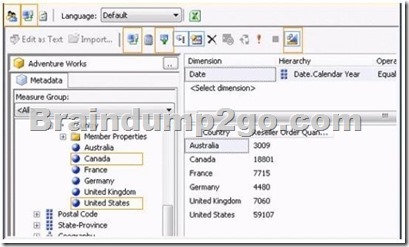
Answer:
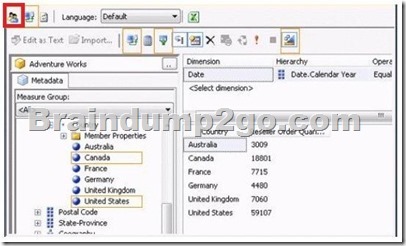
QUESTION 13
You are troubleshooting query performance for a SQL Server Analysis Services (SSAS) cube.
A user reports that a Multidimensional Expressions (MDX) query is very slow.
You need to identify the MDX query statement in a trace by using SQL Server Profiler.
Which event class should you use?
A. Progress Report Begin
B. Query Begin
C. Execute MDX Script Begin
D. Calculate Non Empty Begin
E. Get Data From Aggregation
F. Query Subcube
Answer: B
QUESTION 14
Drag and Drop Questions
You are developing a SQL Server Analysis Services (SSAS) multidimensional project that is configured to source data from a SQL Azure database. The cube is processed each night at midnight. The largest partition in the cube takes 12 hours to process, and users are unable to access the cube until noon.
The partition must be available for querying as soon as possible after processing commences.
You need to ensure that the partition is available for querying as soon as possible, without using source data to satisfy the query.
Which three actions should you perform in sequence? (To answer, move the appropriate actions from the list of actions to the answer area and arrange them in the correct order.)

Answer: 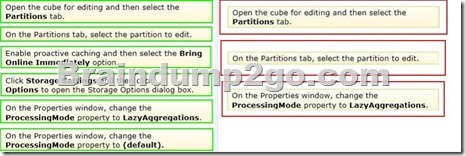
Explanation:
* Processing mode has two possible options.
Regular. This is the default setting. When set to regular, partitions will be available to users after data has been loaded and aggregations are created completely. Lazy Aggregations. When set to lazy aggregations, partitions will be available to user queries immediately after data has been loaded. Aggregations will be created as a separate background process while users start to query the partition.
* Lazy processing performs the task of building indexes and aggregations for dimensions and measure group partitions at a lower priority to reduce foreground processing time and to allow users to query the cube sooner. For lazy processing to occur, you must switch the ProcessingMode = LazyAggregations of your measure group partitions; by default this value is Regular (lazy processing is turned off). When processing a dimension with flexible aggregations such as parent-child or virtual dimension by using the processing enumeration of ProcessUpdate (such as to take into account of member name or hierarchy changes), lazy processing is initiated to ensure that the aggregations are rebuilt on the associated measure group partitions.
* Configure Lazy Processing for the cube, measure group, or partition. If you configure Lazy Processing, the dropped aggregations are recalculated as a background task. While the flexible aggregations are being recalculated, users can continue to query the cube (without the benefit of the flexible aggregations). While the flexible aggregations are being recalculated, queries that would benefit from the flexible aggregations run slower because Analysis Services resolves these queries by scanning the fact data and then summarizing the data at query time. As the flexible aggregations are recalculated, they become available incrementally on a partition-by-partition basis. For a given cube, Lazy Processing is not enabled by default. You can configure it for a cube, measure group, or partition by changing the ProcessingMode property from Regular to LazyAggregations. To manage Lazy Processing, there are a series of server properties such as the LazyProcessing \ MaxObjectsInParallel setting, which controls the number of objects that can be lazy processed at a given time. By default it is set to 2. By increasing this number, you increase the number of objects processed in parallel; however, this also impacts query performance and should therefore be handled with care.
* Incorrect: With Bring Online Immediately enabled, during cache refresh all queries are directed to the relational source database to retrieve the latest data for end users. While this provides users with refreshed data, it can also result in reduced query performance given that Analysis Services needs to redirect queries to the relational source database.
QUESTION 15
You are creating a new report in SQL Server Report Builder.
You add a SQL Azure data source.
Then you add a dataset that has four fields named Year, Country, Category, and Sales.
You must design a matrix as shown in the following diagram.
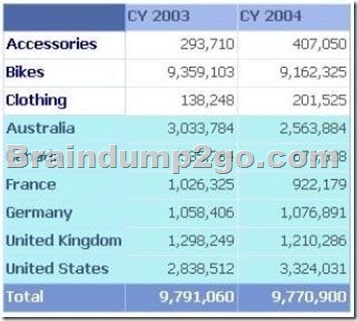
The category rows (the first three rows as shown in the diagram) must present total sales amount by category. The country rows (the next six rows as shown in the diagram) must present total sales amount by country. The total row must present the total sales for each year.
You add a matrix to the report.
You add a grouping of the Category field on the rows and a grouping of the Year field on the columns.
You need to add the countries on the rows of the matrix.
Which Row Group option should you select when you add the group?
A. Adjacent Below
B. Parent Group
C. Adjacent Above
D. Child Group
Answer: A
QUESTION 16
Drag and Drop Questions
You are developing a SQL Server Reporting Services (SSRS) report that sources data from a SQL Azure database and a SQL Server Analysis Services (SSAS) cube. The cube contains a date dimension and other dimensions. The report design includes two report parameters named StartDate and FinishDate as shown in the following diagram.
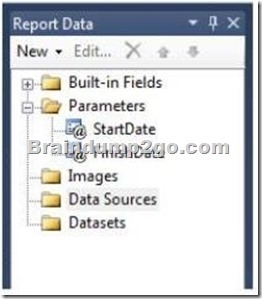
The Data Type property of the parameters is set to Date/Time. The Data Type property of the parameters is set to Date/Time.
You need to create the dataset based on the SSAS cube.
You also need to ensure that the dataset is filtered by the existing report parameters.
Which three actions should you perform in sequence? (To answer, move the appropriate actions from the list of actions to the answer area and arrange them in the correct order.)
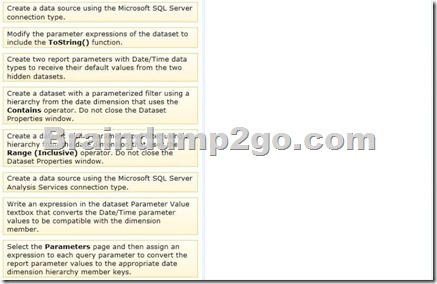
Answer:
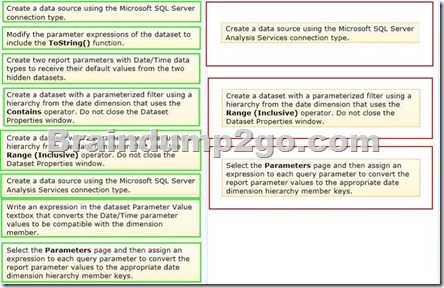
Explanation:
* In Reporting Services, a dataset is based on an existing a data source.
A dataset specifies a query, query parameters, filters, and a field collection.
You can also specify data options, such asd case, collation, kanatype, width, and accent, for the data retrieved from the data source. For more information, see Understanding Report Datasets.
To create a dataset, you must have defined an embedded or shared data source.
* When you deploy Reporting Services, a set of data processing extensions are automatically installed and registered on both the report authoring client and on the report server to provide access to a variety of data source types . SQL Server 2008 Reporting Services (SSRS) installs the following data source types: Microsoft SQL Server, Microsoft SQL Server Analysis Services, Oracle, SAP NetWeaver BI, Hyperion Essbase, Teradata, OLE DB, ODBC, and XML.
* To define a query parameter in MDX in Design modeAfter you run the query, click Design on the toolbar to toggle to Query mode to view the MDX query that was created. Do not change the query text in Query mode if you want to continue to use Design mode to develop the query. Click Design to toggle back to Design mode.
* To create a datasetIn a few cases, the field collection specified by the query can only be determined by running the query on the data source. For example, a stored procedure may return a variable set of fields in the result set. Click Refresh Fields to run the query on the data source and retrieve the field names that are needed to populate the dataset field collection in the Report Data pane. The field collection appears under the dataset node after you close the Dataset Properties dialog box.
The dataset and its field collection appear in the Report Data pane under the data source node. Reference: How to: Create a Dataset (Reporting Services);
How to: Define Parameters in the MDX Query Designer for Analysis Services (Report Builder 3.0 and SSRS)
QUESTION 17
You install SQL Server Reporting Services (SSRS).
You need to restore a copy of the symmetric key.
Which command should you run?
A. rskeymgmt -d
B. rskeymgmt -a -f %temp%\rs.key -p Password1
C. rskeymgmt -e -f %temp%\rs. key -p Password1
D. rskeymgmt -1
Answer: B
QUESTION 18
You are designing a SQL Server Reporting Services (SSRS) report based on a SQL Server Analysis Services (SSAS) cube.
The cube contains a Key Performance Indicator (KPI) to show if a salesperson’s sales are off target, slightly off target, or on target.
You need to add a report item that visually displays the KPI status value as a red, yellow, or green circle.
Which report item should you add?
A. Data Bar
B. Indicator
C. Radial Gauge
D. Linear Gauge
E. Sparkline
Answer: B
QUESTION 19
You are designing a SQL Server Reporting Services (SSRS) report to display vineyard names and their year-to-date (YTD) grape yield. Grape yield values are classified in three bands:
– High Yield
– Medium Yield
– Low Yield
You add a table to the report. Then you define two columns based on the fields named VineyardName and YTDGrapeYield.
You need to set the color of the vineyard text to red, yellow, or blue, depending on the value of the YTD grape yield values.
What should you do?
A. Use an expression for the TextDecoration property of the vineyard text box.
B. Use an expression for the Color property of the vineyard text box.
C. Add an indicator to the table.
D. Use an expression for the Font property of the vineyard text box.
E. Use an expression for the Style property of the vineyard text box.
Answer: E
QUESTION 20
You are developing a SQL Server Reporting Services (SSRS) report that renders in HTML.
The report includes a dataset with fields named Description, Price, and Color.
The report layout includes a table that displays product details and also includes columns named Description, Price, and Color.
You need to modify the report so that users can sort products by the Price column.
What should you do?
A. Add a custom action to the Price text box.
B. Set the SortExpression property to =Fields!Price.Value for the Price text box.
C. In the Expression dialog box for the Price text box, enter the =SortBy FieldslPrice.Value expression.
D. Set the SortExpression value to =Fields!Price.Description for the Price text box.
Answer: B
All Braindump2go 70-460 Exam Dumps are Promised One Year Free Updation — We will inform you when your products have new questions and Answers updation! Download Microsoft 70-460 Practice Tests Questions Full Version Now – Pass 70-460 100% One Time!
